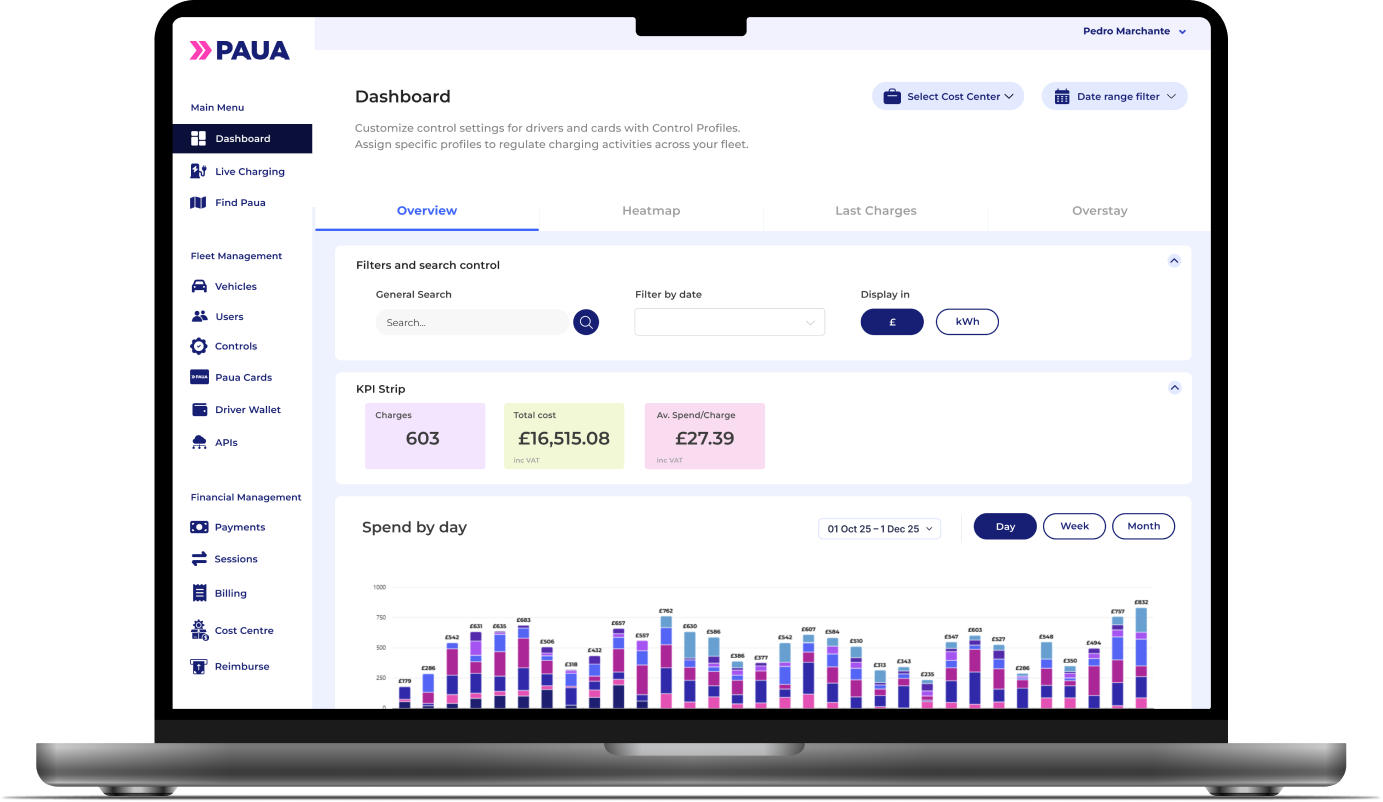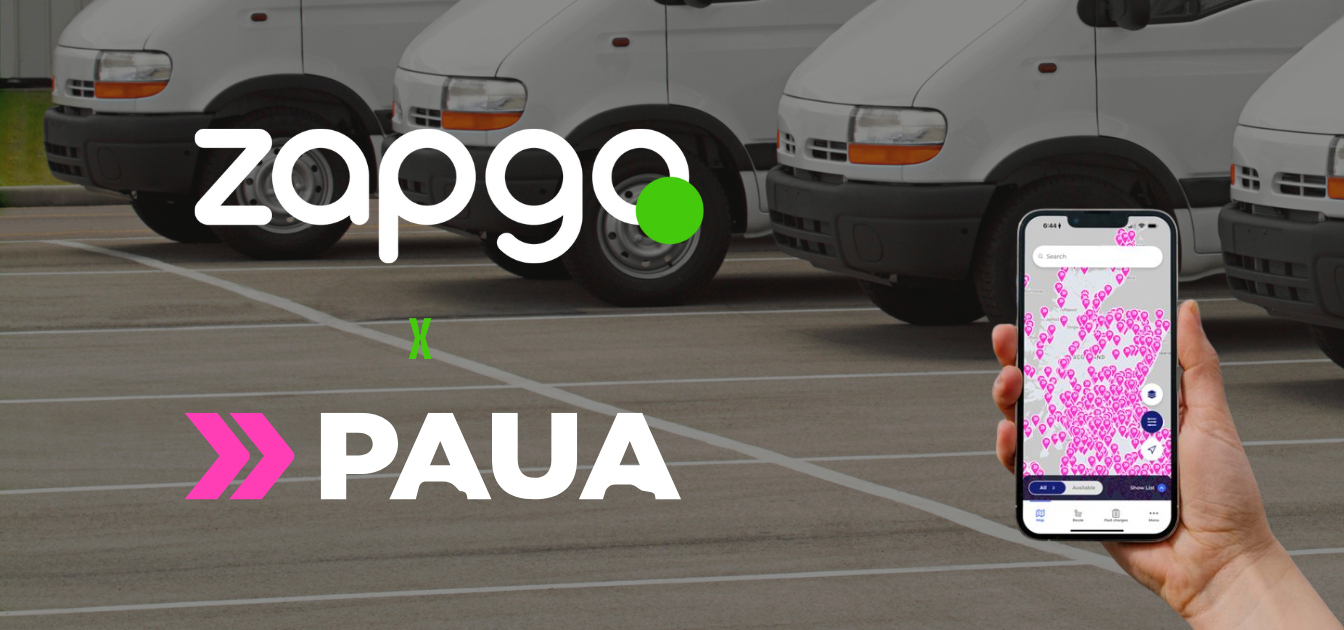TL;DR
Charging costs for electric vehicles vary depending on the size of the battery and electricity prices, ranging from £1.50 to £62.10. Paua simplifies the process for business fleets by offering solutions to recover VAT from public charging. Home charging, public charging rates, and how far you can drive on a charge are also discussed.
It costs £1.50 to £62.10 to charge an electric car.
The cost to charge an electric car = cost of electricity x size of car battery.
In this blog post we will show you how to calculate the cost to charge an electric car. By the end of this post you will be able to tell your colleagues, friends and employee’s all about the basics of costs for charging an electric car. You will also find out a number of interesting facts that not many others know.
Paua is a specialist in public electric car charging and is a provider of electric car charge cards for use on public chargers but we will consider home charging as well as free charging as part of this article. Sign up to Paua here.
Let’s start with some definitions.
The cost of electricity – key for the cost of electric car charging
This is the same as you see on your home energy bill. It is measured in pennies or pounds per kWh. Prices for home electricity are around 20p/kWh with the lowest prices starting at 5p/kWh. Public charging is more expensive and can cost up to 69p/kWh. However there are still places where you can find charging for free
A quick check on those units of electricity
We are all familiar with pounds and pennies. But kWh could be confusing to some. This is the unit of energy and is spoken as “kilo-Watt-hour”. Note that James Watt was a famous Scottish Inventor. Because Mr Watt was a person the unit is always capitalised so you should always see a capital “W” when people talk about Watts. Now you are an expert in units of electricity!
Few people know this, and you regularly see the Newspapers get this wrong.
How big is your battery? How much do you need to spend to fill your electric car?
You need to know how much energy you require to fill your battery. This is the same as knowing how big your petrol or diesel tank is on a conventional car. Car battery size is also measured in kWh. Car battery sizes can range from 30kWh similar to the old Nissan Leaf (some were even smaller) up to massive 90kWh battery packs found in some of the largest Tesla’s.
The calculation – how much does it cost to charge an electric car
So now you have those basics under your belt lets get to the calculation. This section is basic maths so lets get a calculator out and do some sums.
As we noted earlier the cost to charge an electric car = the cost of electricity x the size of the battery
So in our smallest battery case above we had a Nissan Leaf with a 30kWh battery. Lets also assume that our Nissan Leaf driver is pretty savvy and has the best electricity price they can get at home at 5p/kWh.
Cost to charge the Nissan leaf = 5p/kWh x 30kWh = £1.50
And if we now look at the cost of the Tesla with the huge 90kWh battery. Having bought such an expensive car we have decided that Mr Tesla is going to charge on the most expensive chargers in the country which are Ionity ultra-rapid chargers (sound cool don’t they!). these chargers cost 69p/kWh to charge. And incidentally these chargers are available with Paua electric charge card!
Cost to charge Tesla = 69p/kWh x 90kWh = £62.10
Quite quickly you can see that the costs to charge an electric car can vary quite widely.
The handy table on how much it costs to charge an electric car
We have prepared a handy table to support you with the costs to charge other electric cars at different prices. To read this table find your battery size in the left hand column and read across until you find your electricity price in pennies. The number in that cell is the cost to charge the battery in pounds.
So a electric car with a 40kWh battery charging at 20p/kWh costs £8.00 to charge.

So now you are an electric car charging cost expert. Well almost! Lets give you some more fun facts to ensure you are a true expert..
Some extra fun facts
Firstly let’s remember that you will very rarely charge an electric car from empty to full. So most of the time the costs will be less than illustrated above.
Lets also briefly consider tax
This is really important for a business and an area that Paua focuses on. Home electricity is taxed at a lower tax rate than electricity in the public domain. Home electricity is taxed at 5%. But as a business you cannot get your tax back on this electricity without some significant complexity.
However public electric car charging has 20% tax applied to it and this can be recovered by a business. You need a valid tax receipt to do this. Obtaining this receipt from chargepoint operators can be very challenging (more on this in a separate article). Paua simplifies this experience for business fleets by providing a single VAT bill alongside the electric charge card. This means your account department can recover VAT.
Now all of the costs above can be reduced by 20% and the cost to charge your electric car just reduced by 20%.

Who provides electricity tariffs?
Electricity tariffs at home come from your electricity supplier. Check to see if you are on the best rates. Some of the best come from companies such as EDF Energy and Octopus Energy.
How long does it take to charge my electric car?
So to answer this question you need to know how big your battery is (but you know that from earlier). And you need to know your charger power. A home charger is 7kW power. A public charger can range from 5kW right up to 350kW.
Now hear is the tricky bit – the car cannot always charge at full power. We can assume that from 20% to 80% of the battery capacity that you can get near full power.
So for 20kWh of energy to be transferred from a 7kW charger this may take 3hours
But the same 20kWh on a 350kW charger might be nearer 3 and a half minutes.
But how far can I drive?
So you made it this far and you have one last question – how far can I drive.
This depends on your vehicle but we have a simple approximation for you. Again you need a new unit which is how many miles you can travel for every unit of energy placed in your electric car. This is measued in miles / kWh (not to dissimilar to miles per gallon).
A common assumption here is 3miles/kWh.
A heavily laden van may do a bit less at 2.5miles/kWh or even lower. An efficient EV driver moving slowly on urban roads could go as high as 5 miles/kWh. But motorway miles or a cold day can change these numbers. Let us stick to 3miles/kWh
Our 30kWh Nissan Leaf can therefore do 90 miles. But our 90kWh Tesla can do 270miles.
And if you made it to this point in our article we believe you genuinely do know the answer to “How much does it cost to charge an electric car”.





